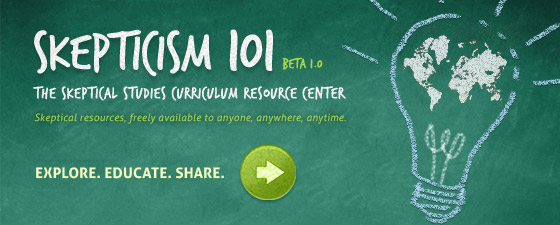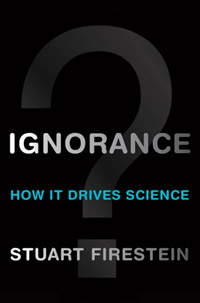July 3, 2012
Or: What it was Like Teaching a Course in Skepticism 101?

On March 31, 2011, I debated Deepak Chopra at Chapman University on “The Nature of Reality” that also featured Stuart Hameroff, Leonard Mlodinow, and several other commentators, all choreographed by the Chancellor of Chapman University, mathematician Daniele Struppa. In the greenroom before the debate Dr. Struppa was reviewing my bio and noted that I am an adjunct professor at Claremont Graduate University and made a comment that I should be an adjunct professor at Chapman as well. I said something like “sure, why not?” and when he introduced me on stage he said something about how I might also one day teach there. Daniele said I could teach anything I want as part of their Freshman Foundations Courses, so I suggested a course on Skepticism 101, or how to think like a scientist (without being a geek). I taught it the Fall semester of 2011 to 35 incoming Freshman students and it was a blast. (continue reading…)
Comments Off on How to Learn to Think Like a Scientist (Without Being a Geek)
June 19, 2012
Steve Jobs’s modus operandi of ignoring reality
is a double-edge sword
Robert Friedland was a long-haired, sandal-wearing, spiritual-seeking proprietor of an apple farm commune and student at Reed College when he met Steve Jobs in 1972 and taught the future Apple computer founder a principle called the “reality distortion field” (RDF). Macintosh software designer Bud Tribble recalled, “In his presence, reality is malleable. He can convince anyone of practically anything.” And yet the blade could cut two ways: “It was dangerous to get caught in Steve’s distortion field, but it was what led him to actually be able to change reality.” Another Mac software designer named Andy Hertzfeld said, “The reality distortion field was a confounding mélange of a charismatic rhetorical style, indomitable will, and eagerness to bend any fact to fit the purpose at hand.” The first Mac team manager Debi Coleman said Jobs “reminded me of Rasputin. He laser-beamed in on you and didn’t blink. It didn’t matter if he was serving purple Kool-Aid. You drank it.” And yet when the power was properly channeled, “You did the impossible, because you didn’t realize it was impossible.”
The RDF is an extreme version of what the psychologist Daniel Kahneman calls a “pervasive optimistic bias” in his 2011 book Thinking, Fast and Slow (Farrar, Straus and Giroux). “Most of us view the world as more benign than it really is, our own attributes as more favorable than they truly are, and the goals we adopt as more achievable than they are likely to be.” For example, only 35 percent of small businesses survive in the U.S., but when surveyed 81 percent of entrepreneurs assessed their odds of success at 70 percent, and 33 percent went so far as to put it at 100 percent! “One of the benefits of an optimistic temperament is that it encourages persistence in the face of obstacles,” Kahneman notes, while also citing study in which 47 percent of inventors “continued development efforts even after being told that their project was hopeless, and on average these persistent (or obstinate) individuals doubled their initial losses before giving up.” Failure may not be an option in the minds of entrepreneurs, but it is all too frequent in reality, which is why another bias called “loss aversion” is felt by most. Thus, Jobs’s success story is also an example of a selection bias whereby those who failed tend not to have biographies. (continue reading…)
Comments Off on The Reality Distortion Field
June 5, 2012
For the forth time in my life I journeyed north on Pacific Coast Highway along the ragged California coast line north of San Simeon and the Hearst Castle where the road turns twisty and the cliffs bend vertical. The Esalen Institute is nestled on the ocean side of the highway atop some bluffs dotted with buildings that include yoga rooms, Yurts, Spartan housing overlooking the ocean, a soup kitchen-like cafeteria serving spectacularly healthy food (lots of Tofu and veggies, no tri-tips or ribs), and workshops catering to just about every belief ever investigated and found wanting in the pages of Skeptic magazine.
Nevertheless, I loved my time there once again, not only for the breathtaking scenery and unprecedented views, or the invigorating cycling and hiking, or the natural hot springs pouring out of the mountain and into elegantly designed hot tubs (clothing optional, and most opt to go without), but for the apparent incongruity made congruous when we consider our mission as skeptics to take our message of science and critical thinking to those who need to hear it most.
My workshop was entitled “Science, Spirituality, and the Search for Morality and Meaning.” First, I must say that the 24 participants in my workshop were already as skeptical as one might find at one of our Sunday Caltech lecture series meetings and dinners. All were well-read in the sciences and humanities to the point that I learned as much as I taught, and the ensuing conversations both during and after the lectures, along with at the meals, were exceptional. (continue reading…)
Comments Off on A Weekend of Woo (Or why I love the Esalen Institute)
May 26, 2012
Reviews of The Moral Molecule: The Source of Love and Prosperity by Paul J. Zak, and Moral Origins: The Evolution of Virtue, Altruism, and Shame by Christopher Boehm. This piece was originally published in both the print and online edition of the Wall Street Journal on May 26, 2012, under the title “Kin and Kindness.”
It is the oldest and most universally recognized moral principle that was codified over two millennia ago by the Jewish sage Hillel the Elder: “Whatsoever thou wouldst that men should not do to thee, do not do that to them. This is the whole Law. The rest is only explanation.” That explanation has been the subject of intense theological and philosophical disputation for millennia, and recently scientists are weighing in with naturalistic accounts of morality, such as the two books under review here.
Paul J. Zak is an economist and pioneer in the new science of neuroeconomics who built his reputation on research that identified the hormone oxytocin as a biological proxy for trust. As Zak documents, countries whose citizens trust one another have higher average GDPs, and trust is built through mutually-beneficial exchanges that result in higher levels of oxytocin as measured in blood draws of subjects in economic exchange games as well as real-world in situ encounters. The Moral Molecule is an engaging and enlightening popular account of Zak’s decade of intense research into how this molecule evolved for one purpose—pair bonding and attachment in social mammals—and was co-opted for trust between strangers. (continue reading…)
Comments Off on Unto Others
May 22, 2012
This review of Ignorance: How it Drives Science by Stuart Firestein (Oxford University Press, May 2012, ISBN 13: 97801-998-28074) was originally published in Nature, 484, 446–447 (26 April 2012) as “Philosophy: What we don’t know.”
At a press conference on February 12, 2002, the United State Secretary of Defense Donald Rumsfeld employed epistemology to the explain U.S. foreign entanglements and their unintended consequences: “There are known knowns. There are things we know we know. We also know there are known unknowns. That is to say, we know there are some things we do not know. But there are also unknown unknowns, the ones we don’t know we don’t know.”

It is this latter category especially that is the focus of Stuart Firestein’s sparkling and innovative look at ignorance, and how it propels the scientific process forward. Firestein is Professor and Chair of the Department of Biological Sciences at Columbia University, where he teaches a wildly popular course on ignorance, inviting scientists in as guest speakers to tell students not what they know but what they don’t know, and even what they don’t know that they don’t know. (Would you rather earn an A or an F in a class called “Ignorance”?, he muses.) This is a slim volume about a fat topic, but Firestein captures the essence of the problem by contrasting the public’s understanding of science as a step-wise systematic algorithm of grinding through experiments that churn out data sets to be analyzed statistically and published in peer-reviewed journals after a process of observation, hypothesis, manipulation, further observation, and new hypothesis testing, with the Princeton University mathematician Andrew Wiles’ description of science as “groping and probing and poking, and some bumbling and bungling, and then a switch is discovered, often by accident, and the light is lit, and everyone says, ‘Oh, wow, so that’s how it looks,’ and then it’s off into the next dark room, looking for the next mysterious black feline” (p. 2), in reference to the old proverb: “It is very difficult to find a black cat in a dark room. Especially when there is no cat.” (continue reading…)
Comments Off on The Unknown Unknowns



